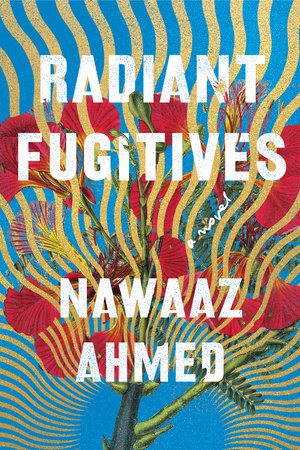 Thanks to Partner NetGalley and Counterpoint Press for the digital ARC of Nawaaz Ahmed’s Radiant Fugitives in exchange for an honest review. The book will be published on August 3, 2021. Radiant Fugitives is an ambitious debut novel with an unusual premise: it’s a story told predominantly in utero by Ishraaq, a sort of omniscient first-person narrator, allowed entry into his relatives’ perspectives before he takes his first breath. We know from the beginning that his mother, Seema, has died during labor, a piece of knowledge that casts a shadow over the book. It’s then that Ishraaq takes us back, unveiling the pasts of Seema and of the rest of his family—his aunt Tahera, his grandmother Nafeesa, and his father Bill—to consider what has led them to this point. What’s revealed is a complex story that made me ache: it’s full of misunderstandings and missed connections that show the way these characters love each other and yet hurt each other, over and over again. It’s set against the backdrop of the candidacy and election of Barack Obama as President, driven by hope and (all too often) disappointment from those who have dared to hope. Seema and Tahera immigrated to the United States from India. Seema left home when, after coming out to her family, her father exiled her. Her sister Tahera, a doctor, moved to the U.S. because of her marriage to a man with whom she forges a family who adheres strictly to Islam. It has been many years since their mother Nafeesa saw Seema, but now they’re united because Nafeesa insists that she must help Seema through the end of her pregnancy . . . and also because Nafeesa is dying. The narrative weaves together these characters’ lives, circling around and back through time, until we delve deeply into their thoughts and feelings, alternately empathizing with them and frustrated by them, by their stubbornness and their inability to reach outside of their own vulnerability to each other. There’s much to admire in the way that Ahmed explores identity, in the ways that Seema is embraced by some and exiled by others because of her sexuality and that Tahera faces the same treatment because of her faith. The fact that those inconsistent reactions occur both among strangers and within their family is painful. While there’s much to love and admire about this book, I did find the pacing to be slow, and I took several breaks from it to read other books. I think part of my issue is because of the internal nature of the narrative, and part is because the book is, often, quite sad. Still, Ahmed is considering here questions that we are—and should be—asking, about who we choose to govern and why, about who and what we welcome and accept, and about how each of us shapes an identity because of and against our families. Behind it all is Ishraaq, a character who loves his family with such compassion and empathy and understanding that he forgives all, sharing their stories as utterly beautiful and utterly alive, even in tragedy. The contradiction inherent in the title Radiant Fugitives is borne out beautifully through Nawaaz Ahmed’s novel.
0 Comments
Leave a Reply. |
AuthorI'm Jen Moyers, co-host of the Unabridged Podcast and an English teacher. Archives
July 2021
Categories
All
|
Proudly powered by Weebly
 RSS Feed
RSS Feed